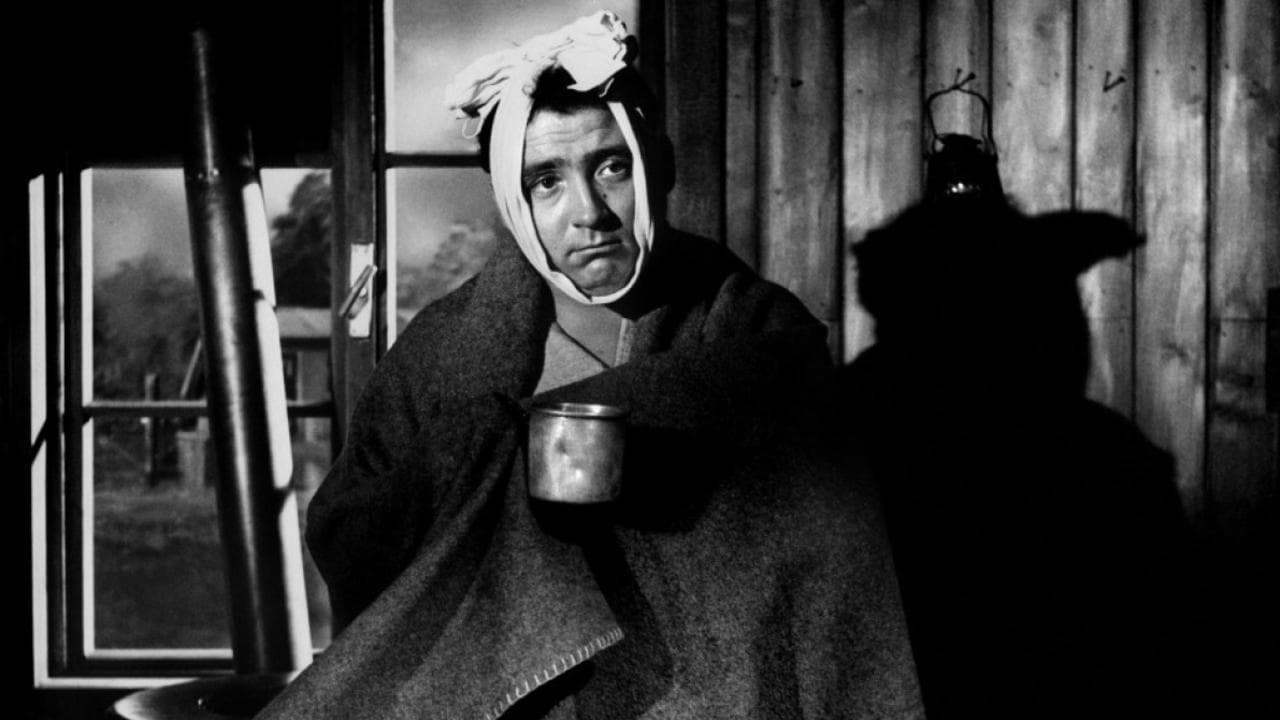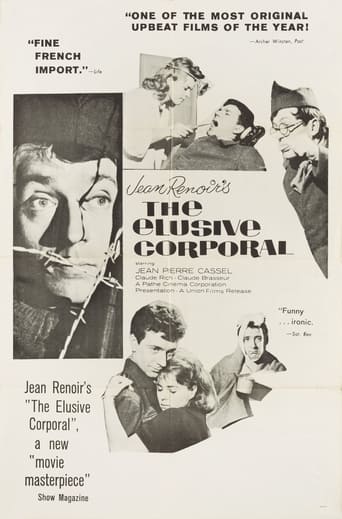

That was an excellent one.
... View MoreThis is a tender, generous movie that likes its characters and presents them as real people, full of flaws and strengths.
... View MoreI cannot think of one single thing that I would change about this film. The acting is incomparable, the directing deft, and the writing poignantly brilliant.
... View MoreThe thing I enjoyed most about the film is the fact that it doesn't shy away from being a super-sized-cliche;
... View MoreJean Renoir produced a fairly long string of masterpieces. This film, "The Elusive Corporal", is one of his least well known. Released at the tail-end of his career it is typically compared to "La Grande Illusion", a seminal film released by Renoir a quarter century earlier. Indeed, "Corporal" seems to play off the reputation of "Illusion", both films containing a number of parallels and reversals. Where "Illusion" was set during the First World War, for example, "Corporal" nosedives into the Second. Meanwhile, both films contain French soldiers attempting to break out of German prison camps, both contain botched escape attempts, both contain heroes who repeatedly shrug off their failures, and both end with two men scrambling toward national borders, Switzerland in "Illusion", Paris in "Corporal". And of course "Corporal" was Renoir's first film in years to be shot in black-and-white, a strange choice, but one which recalls the director's work in the 1930s.Despite all these similarities, "Corporal" is much more lighthearted in tone. Jean Pierre Cassel stars as our hero, a French enlistee who has surrendered to the Nazis. He spends the film ensconced in a detention camp, from which he stages a series of hilarious escapes. There are shades of "Cool Hand Luke", shades of Bresson's "A Man Escaped", but Renoir's tone is gentler, more lighthearted (ie "Stalag 17"). In his hands, Cassel isn't struggling to escape, but is already always free. The Germans can't contain his self-determination, cannot break his will. Cassel's character is himself always several steps ahead of the competition, always subtly judging, perceiving, and withholding information. He remains elusive to even his fellow prisoners, refusing to give of himself over to any and everybody.The film was based on a Jacque Perret novel, but Charles Spaak, who co-wrote "Illusion", did some uncredited writing on "Corporal's" screenplay as well. Unsurprisingly, "Corporal" features impressive black-and-white photography. Renoir's previous films were in colour, had a bouncy, impressionistic quality, a skill possibly inherited from his father, the Great Renoir, an Impressionist painter. "Corporal", though, echoes Renoir's earlier work, with stark faces, grim shadows, and a droll existentialism. Cassel would star in Melville's "Army of Shadows" several years later.8/10 – The POW or prison movie is a genre which produces an inordinate amount of great films. Renoir's work here can't touch the best in the genre. Worth one viewing.
... View MoreIn 1937, Jean Renoir directed GRANDE ILLUSION, the first great (maybe greatest) POW film and one of the most influential motion pictures ever made. Even though this movie shows the influence, one should keep in mind that most POW movies of the time do so as well, from STALAG 17 to BRIDGE ON THE RIVER KWAI. However, rather than focus how THE ELUSIVE CORPORAL resembles GRANDE ILLUSION, what's more interesting I think is how it differs.GRANDE ILLUSION used the POW camp as a metaphor for society, with all three classes represented. This film does not. It has no wealthy aristocrats, like Erich Von Strohiem's character. Some might compare Rich's character Ballochet to Pierre Fresney's Captain Boldieu, but doing so neglects that Ballochet is not an aristocrat; he only acts like one. Before becoming a POW, he was a gas meter attendant. Staying in the prison camp allows him to escape reality, for it offers him a deluded and misguided sense of comfort. This is why he does not want to leave it (until his final moment of self completion, of course). In this respect, Ballochet is unlike any character in GRANDE ILLUSION.Saying that the POW camp in THE ELUSIVE CORPORAL reminds one of a country club ignores that virtually every other prisoner-of-war movie did the same. Only Bryan Forbes's unique KING RAT, released three years after this one, was a film that showed a prisoner-of-war camp as Godawful. I also don't see how viewers could interpret life in this film's camp is all that enviable. While it's true that Ballochet obtains a sinecure that allows him easy work and extra rations, the movie clearly condemns him and also shows that he's an exception. Many times, we see most prisoners working, often performing menial, unheroic labor (ie, emptying the latrine's cesspool tank--a symbol of those, like Ballochet or Pater, who choose the stagnation of remaining in prison). Rarely do we see the prisoners idling the time away. Unlike most POW movies, we're reminded that they are not only prisoners, but enslaved labor.If one wants comparisons, one might more profitably compare THE ELUSIVE CORPORAL to French prison movies made just a few years before it (ie, A MAN ESCAPED and LE TROU). Like those films, this movie's concerns are not so much for society but for individuals, and, like THE ELUSIVE CORPORAL, they use escape as a metaphor for attaining selfhood (unlike GRANDE ILLUSION, which shows that even after escaping the prison, the prisoners still remain imprisoned---by their illusions).Maybe this movie is not a perfect film (though I'm not sure about that), but it's certainly worthwhile. It's beautifully lensed, often presenting a gray, misty look. It intersperses documentary footage to remind us of how chaotic the reality outside the camp was like. And yes, one can say it resembles GRANDE ILLUSION, but one could also just as easily say it resembles PAPILLION. The point is not that it doesn't, because, actually it does. But then again, it's also quite different. That it was made with such a small budget proves that Renoir's genius was still potent even toward the end of his career. It's a dramatic, humorous, subtle, and under-appreciated work of cinema.
... View MoreJean Renoir was always spared by the Nouvelle Vague critics.And however,if you've seen all his great films of the thirties (roughly from "la Chienne" to "La Règle du Jeu" )you may possibly find his latter days works disappointing:"le Déjeuner sur l'Herbe" and his pitiful attempt at a "Dr Jekill and M.Hyde" "Le Testament du Docteur Cordelier" "Le Caporal epinglé " is a different matter for it has its moments and the cast (Rich,Cassel,Claude Brasseur) is so perfect I do not need to add to the praise they have already received.When I was a child ,I remember what my mother said when she saw the movie when it was theatrically released ;she did not like it very much.Six or seven years later,when I had the opportunity to see it ,I told her I did not understand her and that I had liked it ."Some day you will find out" was the answer.At the time,I did not know even Renoir's name.Now that I've seen most of his movies,I do not take the same view as I did:I do not think,as it has often been mooted that it's a remake of "la grande illusion" although there are similarities between the two works.But Autant-Lara's "La traversée de Paris" or Henri Verneuil's "La Vache et le Prisonnier" (aka "the cow and I") which were pejoratively labeled "Cinema de Qualité" by the Young Turks were not inferior to "le Caporal Epinglé".Renoir's humor is sometimes vulgar and you'd better take "Stalag 17" instead.In the twenties his "Tire au Flanc" displays the same questionable coarse comedy side."La Grande Illusion" is one of the greatest films of the FRench cinema.Although it takes place during WW1,we never feel how atrocious that war was."Le Caporal Epinglé" takes place in a prison camp.And except for a few moments (Claude Rich's escape for instance) ,the soldiers seem to live in a holiday camp."LE Caporal Epinglé " is an entertaining movie though and the best scenes ,IMHO,are to be found outside the camp: Cassel on the dentist's chair is worth the price of admission.And the scene on the train with the naughty brat ("Be quiet or the gentleman will take you to war") is hilarious.
... View MoreTowards the end of his working life - he shot only one more film and that initially for television - Renoir returned to the milieu of one of his greatest successes, La Grande Illusion, shot Le Caporal epingle in black and white and set it largely in prison camps though this time the war in question was the Second World War as opposed to the first and as he could hardly replicate the acting quality of Gabin, Stroheim, Carette, Dalio, etc perhaps wisely he opted to go with a definite second eleven headed by Jean-Pierre Cassel and featuring Claude Rich and Claude Brasseur. There's not a lot of sunshine or hope on offer; dismal seems to be the prevailing colour and each time Cassel takes one step forward he goes back two. Perhaps the best description is picaresque by virtue of the motley characters he encounters which transform him into a sort of captive Candide. Charles Spaak, who had written La Grande Illusion, worked uncredited on Caporal and maybe he should have worked harder for though it holds the attention it remains inferior to La Grande Illusion.
... View More